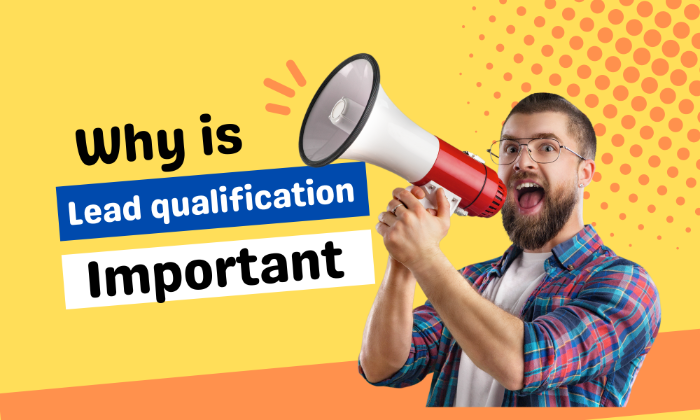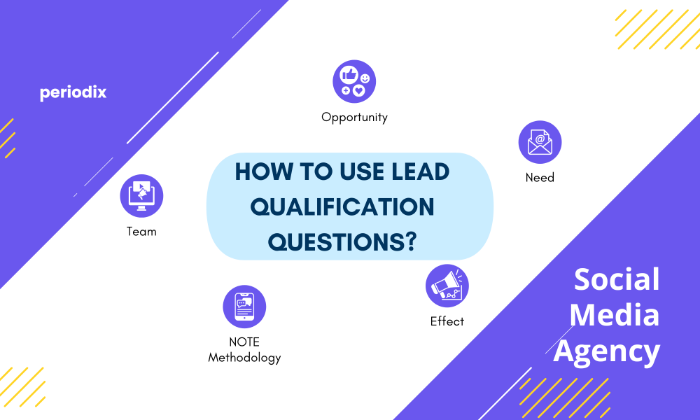Have you ever wondered why; your marketing strategy has been suffering? What is the reason that sales are not increasing? Why your marketing strategy is failing badly? All these questions are essential to ask yourself when your company cannot do good in the field. A failed marketing effort does not slow down the retailing process, but the cost of each trade also increases. There are several reasons behind it. Sometimes the marketers cannot pitch their idea efficiently, and other times it is bad leads generation.
This article will focus on the problems faced by the marketing departments in your company and how to tackle them. The problem of lead qualification will be discussed, solutions will be provided, and the questions that qualify a lead will be provided in this article.
Qualified Leads
A qualified lead is a prospect willing to convert into a customer soon. They are potential clients who show interest in the product or service provided by the company. The potential clients are considered qualified based upon the preset criteria of the company. The prospect has to willingly provide their data to the organization to qualify as a lead. Further, they are divided into two types based on their level of marketing qualified lead and sales qualified leads. Lead qualification is one of the essential parts of lead generation.
Why is Lead qualification Important?

Finding qualified prospects out of random people is quite difficult. Marketing departments receive the contact information of thousands of consumers. Finding the right one Is pretty difficult. Only 27% of consumers are interested in purchasing the products offered by the organization. The marketing department receives almost 70% of prospects are unqualified, which means a waste of time, money, and resources of unwanted people. Marketers push all information gathered through lead generation towards the retailing department. Who has to work on people not interested in purchasing items offered by your company?
This can be easily avoided by asking consumers the sales qualifying questions. These questions could help marketers learn about the interest of consumers in the company's products and services. Companies could know which people are worth putting effort into. Think like this; you pushed all information gathered to the retail team. They received information regarded 100 people, and they started sending emails, messages, and cold cabling. However, among 100 people, only 27 are willing to purchase products offered by the company. 73% resources of the company invested in nurturing prospects are wasted due to unqualified leads in the sales funnel.
By asking the right questions, marketers can save resources from being wasted and assist in making better sales and earning profit for the company.
How to Use Lead qualification Questions?
Asking a question is essential to know purchasers' intentions; people connected to your companies all don't come with the intention of purchasing. Filtering interested people out of rest is rather a difficult task. Organizations ask several questions from prospects to know whether they are interested in purchasing or not. This helps understand how both parties could help each other gain the best. Asking sales qualifying questions is not simple; marketers need to have a plan that they can execute on the right people at the right time. Asking these questions right away might cost you leads.
Several methods are utilized to ask prospects about their interest in the company. Many methods are centered on the company's interests and what they want. However, utilizing questions where the consumer is the key tends to work betters. NOTE a more consumer-centered method of asking these questions can help your company and marketing department. Once these questions are asked, marketers are satisfied with prospects' performance. They could be pushed down further in the sales funnel. The vending team would further nurture them.
NOTE Methodology
NOTE is one of the most interesting methods of asking these lead qualification questions. These questions are more buyer center, and the many marketing experts have appreciated approach. Needs, opportunities, team, and effects are the four pillars of this approach. The whole focus of this approach is on the prospects and how they could benefit from the organization's solutions. The questions like, Are the services of my company needed? What are the opportunities for your company in our services? Which employees will be affected by our services? What effects would emerge out of this cooperation?
These questions are the four pillars of this approach that will be utilized to gain knowledge regarding qualified sales leads. This article will provide you with 32 questions related to the four pillars of this approach. Utilizing these questions in your content is essential to know whom to approach. The article will provide you with a method to ask questions and when to ask questions; all 32 questions provided will help the organization understand the level of prospects in the lead generation campaign.
Need
Need is why a prospect would interact with a company; organizations need to know their needs that their products could fulfill lead qualification could help with that.. B2B clients are different from the normal purchaser; they require a permanent solution to their problems. Often clients are in denial of the problem present in front of them. After gathering data from clients, marketers must understand their interest in the company's product. Marketers need to map out their requirements and solutions the company could provide for their problems.
Start asking questions regarding challenges they face, and ask if they have planned any solutions for their challenges? Are they looking for any solution? How will your product help them out with the challenges being faced? These questions would be put forward in the need section of the lead qualification process. This would show the purchaser's interest in the organization's product and how much further nurturing would be required to highlight their needs.
Questions
In the need section, there would be eleven questions that purchasers would ask buyers. These questions would help understand the requirements of the prospects:
• You are currently looking to deal with (Company's need). This is your current target?
• (Consumer's problem) is this relevant, and what is your thought about this challenge?
• (Your offer) could ease your problem. Have you ever thought about utilizing it?
• We know (the consumer's problem) is a big challenge for your company?
• (Your Offer) Have you ever tried this solution to (consumer's problem) in recent times?
• To meet (consumer's needs), do you have a team of employees working internally, or do you outsource for the requirements?
• You are not looking for a solution to (prospect's need) right now; what is the reason behind this?
• Elaborate on your sales plan; how do you plan on trade?
• Define your targeted industries, and could this we expand, or are the industries narrow?
• Define the main requirement your company has?
• What is the main problem your company is facing?
Opportunity
Filtering the challenges wouldn't cut for you; lead qualification requires further nurturing. You must know what the solution is and show them the worth of your offer. Your company's product has a solution to their problems; let them know how they could use the company's product to their benefit. Nurturing is required, but telling the prospect that your company could be beneficial to them and your offer is required.
This second part of sales qualifying questions shows them the benefits that could come from your company's product. The answer should come from them; ask questions that show them that your company is the solution they were looking for; instead of pitching your product, let them ask for it. Aim your questions in a way that nurtures prospects without them understanding. Prospects need to realize that their organization requires your offer to solve their challenges. Answer that comes from prospects increases their interest in the company, and the further process becomes easy for marketers.
Questions
The following questions are asked in this section of qualifying prospects. For increasing sales, the requirement should come from the consumer, prompt the idea that they need you. The following question would help in this regard:
• Current solutions adapted by the consumer for (consumer's problem). Are you satisfied with them?
• Which challenges are you looking forward to solving with (Your offer)?
• What would an action plan be taken for(consumer's need)? Is the help taken to overcome challenges by (Your offer)?
• Willing to talk regarding (your offer) and its role in solving the (consumer's need)?
• Does this sound favorable to try a solution to (consumer's requirement) through (your offer), adding extra help to the current workforce?• Is a solution urgently required to (consumer's problem)?
• How would (your offer) could help your organization? What are the consequences of utilizing ( your offer) for the (consumer's need)?
• What are the benefits your company could take from (Your offer)?
Team
Several things are yet to be cleared before marketers can involve the sales department. Marketers might be talking to the client company's representative, but they don't have to make the decision. B2B clients are different to deal with; several decision-makers are involved who need to be persuaded. The account-based approach is utilized to take care of them all. However, when you ask the question, it is essential to know that you are putting effort into the right person. Therefore asking a question that could clarify doubts is essential.
The third stage of the sales qualifying question helps marketers understand if they are putting effort into the right person or not. If the other party you are communicating with is the decision-maker, their decision after persuasion would have any worth. If the lead isn't a decision-maker in the company, whole efforts done on nurturing could go to waste.

Questions
The following sales qualifying questions would help marketing departments understand if the person they are communicating with is the decision-maker in their company:
• What kind of role do you play in the decision-making of your company?
• Please can you tell us your job title?
• Are you the one who has the last say in the decision-making process regarding (company's needs)?
• If you don't play a role in decision-making, then it would be best to add someone who is a decision-maker. Can we add some decision-makers to know more about (company's needs)?
• Which team will control the execution of (your service)?
• Any other decision makers in your business would want a solution to the (company's problem) that might be frustrating for their team?
Effect
Expectations might be a challenge your organization could face while dealing with a new B2B client. These sales qualifying questions could help you find if the client has some fake expectations. The expectation would reduce your product or service's effect on your client. Discuss all the important aspects of the product or service provided to the consumer. You must learn what they expect from the company.
The marketing department doesn't aim for sales; the main objective is to create a loyal customer. Asking questions and clarifying all doubts could help establish healthy relationships between clients and sellers, which is essential.
Questions
The following questions would you clarify all the expectations client has:
• What do you expect from our service?
• What results would you Tink emerge from this cooperation?
• What would be the result of (your offer)?
• Why do you decide to utilize (your offer)?
• What do you see from this collaboration in a month/quarter/year?
• Results that are essential, and which results would be nice to have?
• If (your offer) won't solve the (consumer' challenge)?
Conclusion
These lead qualification questions could help you find the real interest of the prospect. Prospects that might not be interested won't be pushed forward in the funnel. The company's main objective is to create a loyal customer at a low cost, and by asking these questions, a company can achieve its goal.

Need more warm leads ?
Outsource the routine process of lead generation with Periodix



































































